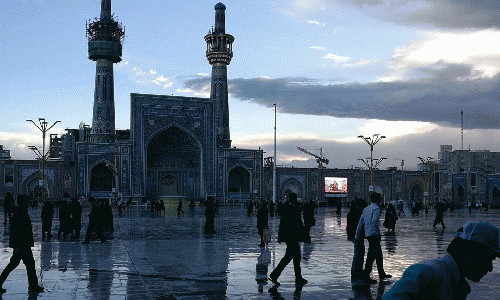From Asia Times
While the dogs of war bark, the Ancient -- and New -- Silk Road goes on forever and a civilization with a long and proud history gets on with lifeThe minute you set foot in the streets of Mashhad, the air smelling of saffron, a fine breeze oozing from the mountains, it hits you; you're in the heart of the Ancient Silk Road and the New Belt and Road Initiative (BRI).
To the east, the Afghan border is only three hours away on an excellent highway. To the north, the Turkmenistan border is less than four hours away. To the northwest is the Caspian Sea. To the south is the Indian Ocean and the port of Chabahar, the entry point for the Indian version of the Silk Roads. The Tehran-Mashhad railway is being built by the Chinese.
A group of us -- including American friends, whose visas were approved at the highest levels of the Iranian government -- have gathered in Mashhad for the New Horizon Conference of independent thinkers. Right after a storm, I'm in a van on the way to the spectacular Imam Reza shrine with Alexander Dugin, which the usual suspects love to describe as "the world's most dangerous philosopher," or Putin's Rasputin.
Debating and discussion timeWe're deep in debate not over geopolitics but ... bossa nova. Exit Sun Tzu and Machiavelli, enter Tom Jobim and Joao Gilberto.
Persia traditionally has been a land of serious intellectual discussion. At the conference, after a lunch break, a few of us decide to start our own geopolitical debate, no cameras rolling, no microphones on. Dugin expands on what multipolarity could be; no universality; pluriversal; a realm of pluralistic anthropology; all poles sovereign. We discuss the pitfalls of Eurasian identity, Islamic identity, sub-poles, India, Europe and Africa.
A few minutes later Iranian scholar Blake Archer Williams -- his nom de plume -- is delving into "The sacred community of Shi'ite Islam and its covenantal dispensation."
Karaj is a bustling three million-strong city one hour away from Tehran by freeway. Early one morning I enter a room in a hawza -- an Islamic seminary. In my previous travels I have visited hawzas in Qom, but never a female-only school. This one harbors 2,275 active students from all over Alborz province up to PhD level. They study philosophy, psychology, economics and politics. After graduation, some will go abroad, to teach in Islamic and non-Islamic nations.
Our Q&A is exhilarating. Many of my interlocutors are already teachers, and most will become scholars. Their questions are sharp; some are extremely well informed. There's so much eagerness to know detail after detail about life in the West.
High academic standardsThe next day I visit the Islamic Azad University; more than four million alumni, 1.4 million current students, 29,000 faculty members, 472 campuses and research centers and 617 affiliated high schools. The Karaj campus is the second in importance in Iran.
This is an extraordinary experience. The hillside campus may not be a UCLA, but puts to shame many prestigious universities across Europe. Not to mention the annual tuition fees; only US$1,000 on average. Sanctions? What sanctions? Most of the equipment may yield from the 1980s, but they have everything they need. As attested by jovial master architect Ali Kazemi, who spent 16 years in Paris after graduating from Nanterre, the academic standards are very high.
Rector Mohammad Hasan Borhanifar -- formerly at the University of Kyrgyzstan in Bishkek -- opens all the doors at the campus. I'm shepherded by Mohammad Hashamdar, from the Faculty of Languages. I talk to the deans of all faculties and have a Q&A with students, mostly in international relations.
Even before the proclamation of the "strongest sanctions in history," everyone wants details on the US Treasury's new form of financial war, even more deadly than a hot war. In slightly more than two months, the purchase of US dollars, steel, coal and precious metals will be banned; there will be no more Iranian imports to the US, and aviation and the car industry will be under sanctions.
Airbus may have to cancel multi-billion dollar orders from Iran. An IT professor tells me Iran can buy excellent Sukhoi passenger jets instead. No Peugeots? "We buy Hyundai."
My interlocutors update me on investments by Total, Airbus, BASF, Siemens, Eni -- its branch Saipem signed a $5 billion deal with the National Iranian Oil Company, NIOC, to develop oil and gas fields and ultimately supply energy to Europe. They confirm that if Total pulls out of the development of the 11th phase of the South Pars gas field, the Chinese CNPC will take over.
(Note: You can view every article as one long page if you sign up as an Advocate Member, or higher).






